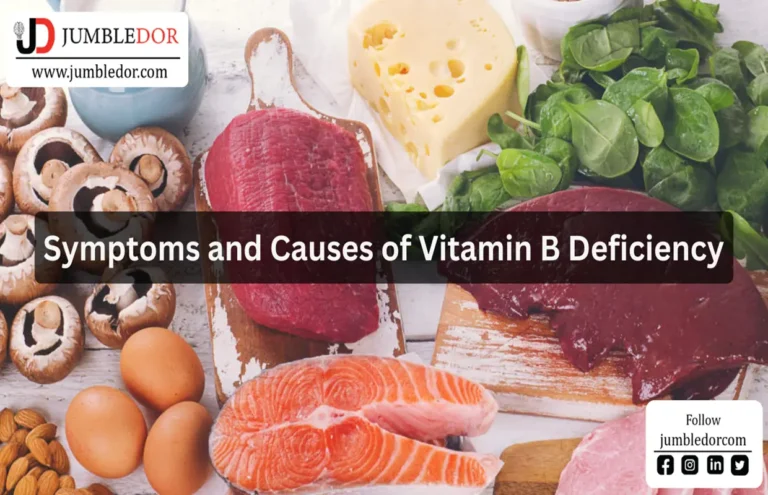In the realm of nutrition, vitamins play a pivotal role in maintaining our overall well-being. Among the essential vitamins, the B-complex family holds a special place, ensuring optimal health for our bodies. However, in the fast-paced world we inhabit, it’s alarmingly easy to overlook these crucial nutrients. In this blog, we delve into the captivating topic of vitamin B deficiency, exploring its symptoms and causes that may surprise you.
Symptoms of Vitamin B Deficiency
At first glance, vitamin B deficiency may seem inconsequential. Nevertheless, beneath its unassuming façade lie a multitude of perplexing symptoms that can have a profound impact on our daily lives. Here are some noteworthy symptoms of vitamin b deficiency to watch out for:
Energy Drain
Feeling constantly fatigued and lacking energy? It may be an early sign of vitamin B deficiency. The B-complex vitamins, including B12 and B6, play a critical role in converting food into energy, and their scarcity can leave you feeling drained and lethargic.
Brain Fog
If you’ve been experiencing difficulties concentrating, memory lapses, or a general mental fog, it might be time to check your B-vitamin levels. These vitamins are essential for maintaining healthy brain function, and their absence can impact cognitive processes.
Mood Swings
The B-complex vitamins are closely linked to the production of neurotransmitters responsible for regulating mood. Insufficient B-vitamin intake may lead to emotional instability, irritability, and even depression or anxiety. Watch out for these symptoms of vitamin b deficiency.
Pale Skin and Brittle Nails
Surprisingly, the health of your skin and nails can also reveal clues about your B-vitamin status. A lack of essential B-vitamins, such as B3 and B7, can manifest as pale skin, dermatitis, or brittle nails.
Causes of Vitamin B deficiency
Now that we’ve acquainted ourselves with the symptoms, let’s unravel the underlying causes of vitamin B deficiency, which may not be as straightforward as you think.
Dietary Deficiencies
One of the most common causes of vitamin B deficiency lies in our diets. B-vitamins are primarily found in animal products, including meat, fish, eggs, and dairy. Consequently, strict vegetarians and vegans may find it challenging to meet their B-vitamin requirements solely through plant-based sources.
Malabsorption Disorders
Certain medical conditions, such as Crohn’s disease, celiac disease, and gastric bypass surgery, are the risk factors of vitamin b deficiency as they can impair the body’s ability to absorb nutrients effectively. As a result, even if your diet includes sufficient B-vitamins, they may not be adequately absorbed, leading to vitamin b deficiency.
Medications and Alcohol
Surprisingly, certain medications can interfere with the body’s ability to absorb or utilize B-vitamins, causing vitamin b deficiency. Antacids, metformin, and some cholesterol-lowering drugs fall into this category. Additionally, excessive alcohol consumption can deplete B-vitamins, as alcohol interferes with their absorption and metabolism.
Age and Lifestyle
As we age, our bodies become less efficient at absorbing nutrients. Coupled with an increased risk of malabsorption disorders and a tendency to eat less, older adults are more susceptible to developing vitamin B deficiencies. Moreover, unhealthy lifestyle choices, such as excessive alcohol consumption, smoking, or a highly processed diet, are also some of the risk factors of vitamin b deficiency.
In a world that never stops moving, it’s easy to overlook the subtle yet profound impact of vitamin B deficiency. From the persistent fatigue that drains our energy reserves to the brain fog that clouds our clarity, the symptoms can silently take hold. By understanding the diverse causes of vitamin b deficiency, such as dietary choices, malabsorption disorders, medications, and lifestyle habits, and by managing the risk factors of vitamin b deficiency, we can empower ourselves to take action. Let’s watch out for the symptoms of vitamin b deficiency, nourish our bodies with vitamin B-rich foods, seek professional guidance when needed, and be attuned to the warning signs. With knowledge in hand, we can break free from the clutches of vitamin b deficiency, embrace vibrant health, and unlock our full potential in this remarkable journey called life.
Articles you may like:
Best Foods Rich in Niacin or Vitamin B3 for Health
Best Natural Sources of Vitamin A


